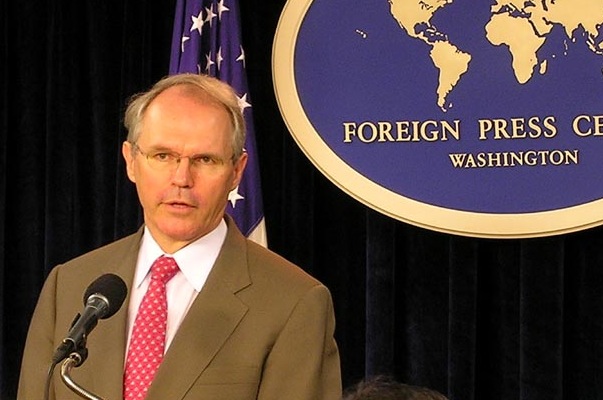Hill Takes on GOP Criticism at Confirmation Hearing
Having never worked in the Middle East, Christopher Hill sought to prove his understanding of the region.
Jul 31, 2020129.1K Shares1.7M Views
Christopher Hill (State Department photo)
Christopher Hill had two hurdles to clear during his confirmation hearing Wednesday morning to become the next U.S. ambassador to Iraq. First, he had to demonstrate his facility with the political, economic and diplomatic challenges that Iraq faces as U.S. troops begin the three-year process of withdrawal. And second, he had to answer criticism brought by a group of Senate Republicans about his tenure as envoy to North Korea. In his two-hour hearing before the Senate Foreign Relations Committee on Wednesday morning, Hill approached the second challenge with greater detail than the first.
Illustration by: Matt Mahurin
Hill, the assistant secretary of state for East Asian and Pacific affairs, is a career diplomat who has served in southeast Europe and throughout east Asia, but he has never held a position in the Middle East. That concern, first raised by Sens. John McCain (R-Ariz.) and Lindsay Graham (R-S.C.)on Mar. 12, has recently been muted thanks to support given to Hill from the previous three Iraq ambassadors and the current commanders of U.S. Central Command and the U.S. military in Iraq. Opposition to Hill’s nomination centers around concerns raised by Sen. Sam Brownback (R-Kans.), who believes Hill deceived him over dispatching an envoy for human rights when Hill represented the Bush administration during negotiations on North Korean nuclear disarmament.
Brownback threatened last weekto delay a vote on Hill before the full Senate. On the Senate floor Wednesday afternoon, he denounced Hill’s record in North Korea, calling him deceitful and a lawbreaker for not including a human rights envoy in the six-nation talks to secure the north’s disarmament. “I do not acquiesce to this nomination,” Brownback said. On the House floor, he did not reiterate his threat to use a parliamentary procedure to block Hill, nor did he call on Hill to resign or for President Obama to withdraw the nomination.
Staffers for the committee said they anticipated a vote on Hill’s nomination to occur during a March 31 business meeting, alongside several pending nominations, including that of retired Gen. Karl Eikenberry, whose confirmation hearing to become ambassador to Afghanistan is scheduled for Thursday morning.
Hill addressed some of the concerns about his lack of Mideast experience with subtlety. He tacitly acknowledged the question of his experience by praising the 1,000-person staff at the U.S. embassy in Baghdad as “one of the finest embassy staffs ever put together” and calling diplomacy “a team sport.” Several embassy staffers have accrued deep experience in Iraq and the Middle East. The incoming deputy, Robert Ford, has served as a political officer in Baghdad since 2004, with a brief interruption to become ambassador of Algeria in 2007. Hill also repeatedly praised the U.S. military, saying that it was “essential” for the country for troops to leave Iraq “with not only a sense of a mission accomplished, but a mission well done.” McCain, Graham and other Republican senators have questioned Hill’s familiarity and comfort level working with the military. But the nominee pledged to work as “one team [with] one mission” with Gen. Raymond Odierno, the commander of U.S. forces in Iraq.
On Iraq itself, Hill often kept to broad themes, but pledged energetic diplomacy. He said his top priority would be to strengthen the political process in Iraq, praising the Iraqi government for conducting successful provincial elections in January, and said the challenge now would be to sharpen the relationship between “the power of the center and the rights of the regions” in order to forestall intensified internal conflict over disputed cities like the multiethnic northern city of Kirkuk.
Repeatedly, he indicated he would push the Iraqis to pass a long-delayed hydrocarbons law, which has snarled in parliament for years over disagreements concerning the distribution of oil revenue. The hydrocarbon law was a law about oil “the way Moby Dick is a story about a whale,” Hill said.
He also pledged to enlist the support of Iraq’s neighbors for its government. “Iraq and Iran need good relations,” he said, adding that if he was authorized to restart the bilateral dialogue with the Iranians over Iraq started under departed Amb. Ryan Crocker, he would convey to Iranians that they would be “well-served by Iranian respect for the sovereignty of Iraq.”
Hill used his experience in the Balkans, where he served as special envoy for Kosovo during the 1999 NATO war, to indicate that he understood the complexity of ethno-sectarian politics. “You can’t wave your hand [and demand], ‘You do this, you do that,’” he said, stressing the importance of understanding local concerns and viewing the problems through the eyes of aggrieved parties. “It does have a ‘deja vu all over again’ feel to it.”
He also indicated his interest in non-traditional diplomacy, specifically praising the governance-capacity building units known as Provincial Reconstruction Teams as “very important.” As part of a policy he’s inheriting, Hill said that 26 PRTs would eventually drop to 16 over the course of the next year, as the U.S. combat brigades that host those PRTs depart Iraq, and said the plan was to drop the total to 6 while “expand[ing] their reach” in terms of assisting the Iraqi provincial and district authorities with governance and development. (There are actually 24 total PRTs in Iraq, when counting the 10 teams that presently embed inside U.S. combat brigades, not 26.) The State Department PRT director for Iraq, Wade Weems, told TWI earlier this monththat eventually all the PRTs would phase out of Iraq by 2011. Additionally, Hill said that the Embassy would plan to take over training the Iraqi police from the military, something sought by the State Department’s bureau of International Narcotics and Law Enforcement Affairs, according to spokeswoman Susan Pittman.
But Hill spent much of his time answering charges raised by Brownback about his tenure negotiating with the North Koreans at the six-party talks to secure their nuclear disarmament during George W. Bush’s second term. Brownback accused Hill of misleading him in a July 2008 Senate hearing by stating that he would bring the administration’s official responsible for monitoring human rights in North Korea, Jay Lefkowitz, to the talks. Prompted by Sens. Richard Lugar (R-Ind.) and Roger Wicker (R-Miss.), Hill said that what he had actually told Brownback was that he would ask Lefkowitz to paticipate in negotiations with the North Koreans after they had progressed beyond “phase two,” which focused strictly on nuclear disarmament, and into “phase three,” a broader discussion of normalized relations. “The problem, Senator, was that we were not able to get beyond phase two,” he told Lugar.
In the 2008 hearing, though, Hill did specify that there were separate phases to the North Korean negotiating process. But he did not indicate clearly that that he would include Lefkowitz only during the normalization phase. Instead, he said, “
Though Hill did not acknowledge the discrepancy, at Wednesday’s hearing he expressed regret over not clarifying his position as the negotiations advanced. “In retrospect, Senator,” Hill told Wicker, “when I realized we weren’t going to get to Phase Three, I should have gone back to Sen. Brownback.”
Despite the questioning, no GOP senator on the panel expressed opposition to Hill, who has already won the support of Lugar, the ranking Republican on the panel. Several referred to meetings with Hill this week and coming away impressed. Sen. Johnny Isakson (R-Ga.) said the “only question needed an answer to” was how Hill would match Crocker’s performance in Baghdad, to which Hill replied, “I just don’t want to screw it up.”
Lugar threw a jab at Brownback without mentioning his name. “We’re at war,” he said. “This is not a parliamentary struggle among senators with different points of view.” Sen. Bob Casey (D-Pa.) added that critics of the past several years’ worth of negotiations with North Korea should “take their fight to the previous administration” that Hill served.

Rhyley Carney
Reviewer
Latest Articles
Popular Articles

